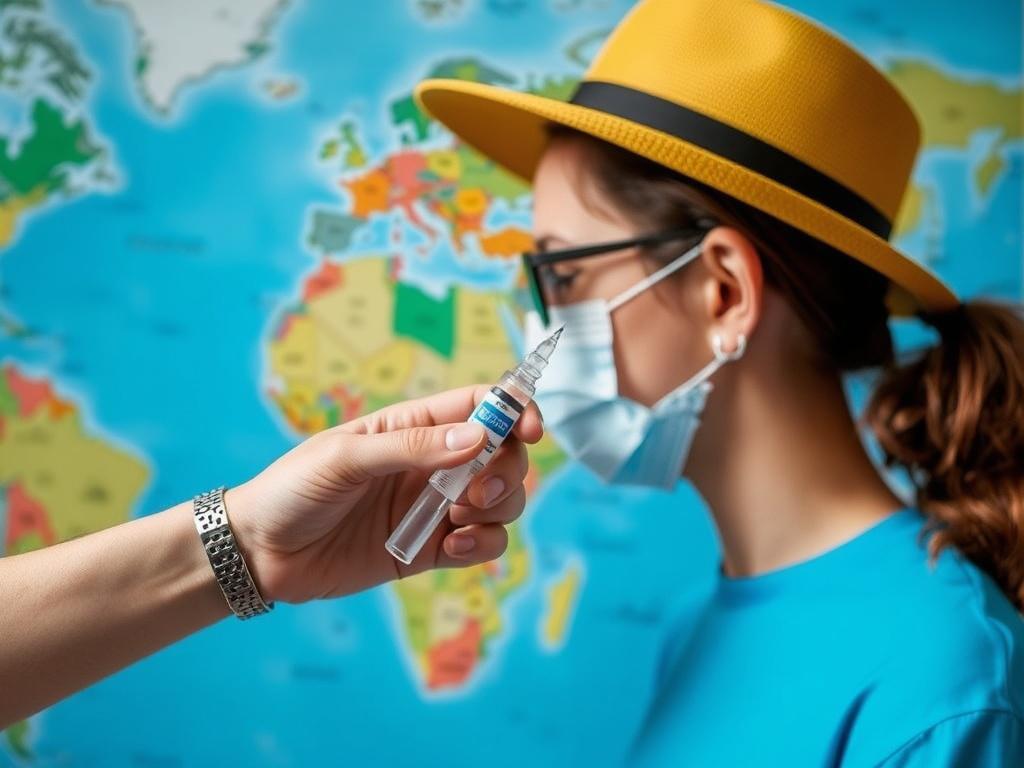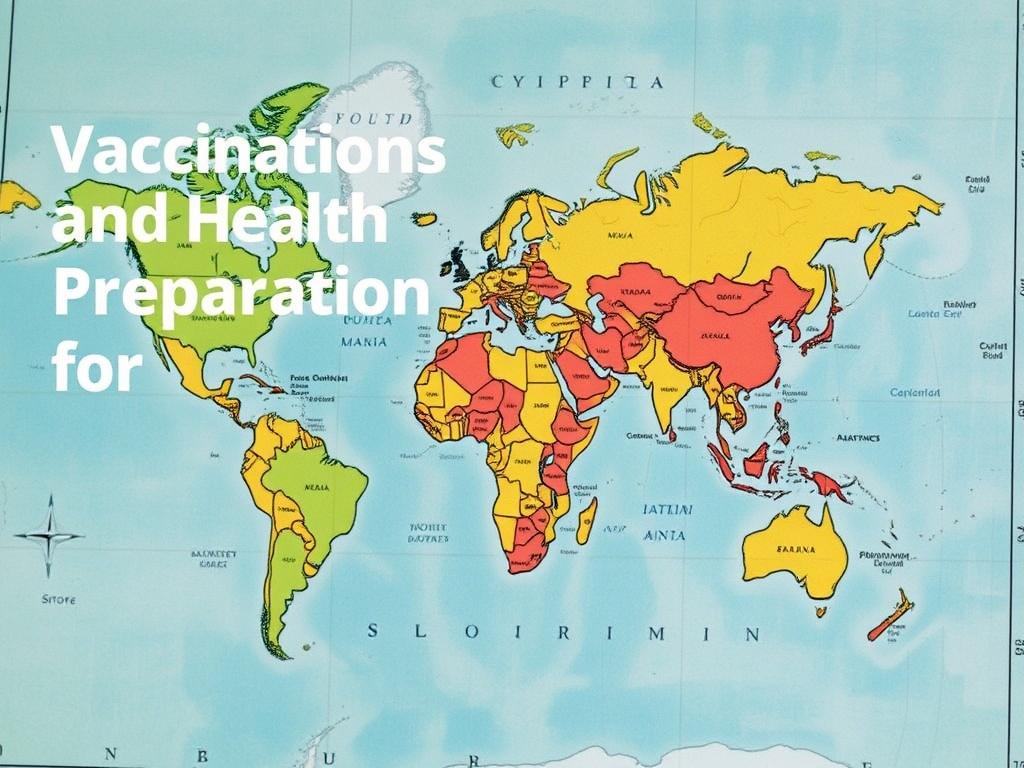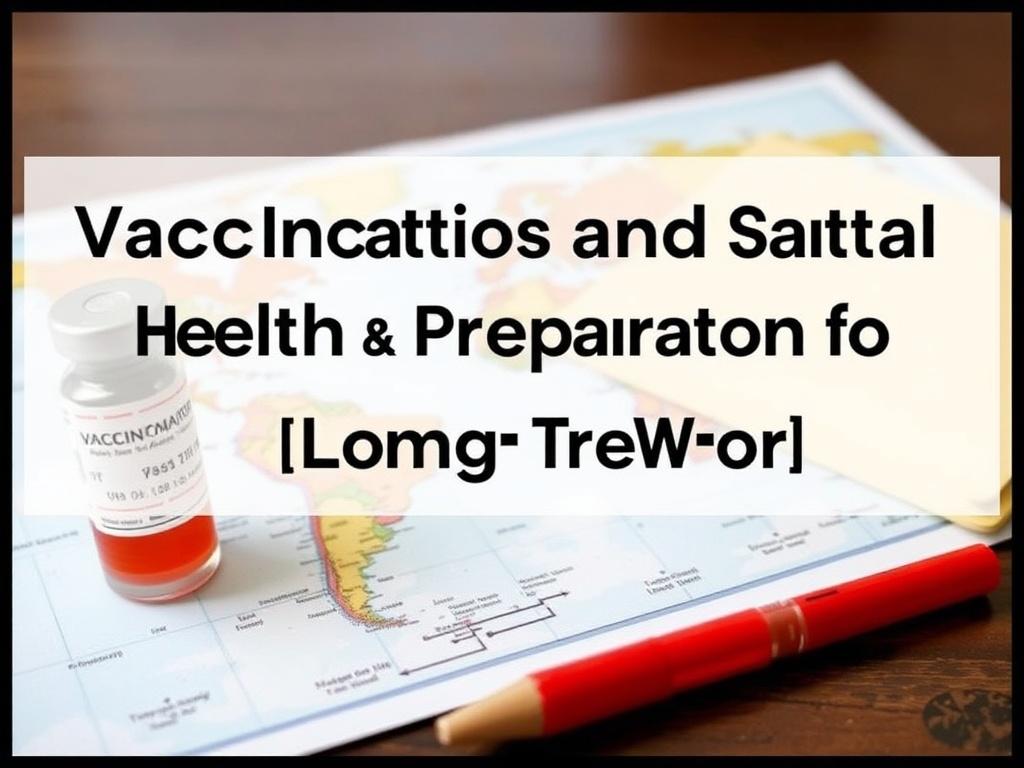Embarking on long-term world travel is an exhilarating adventure that promises rich experiences, cultural exchanges, and unforgettable memories. However, before you pack your bags and jet off to distant lands, a critical part of your preparation involves safeguarding your health. Understanding vaccinations and health preparation is essential to avoid preventable illnesses and ensure your journey remains a joyful one.
Many travelers underestimate the importance of health prep when planning their trips, especially those lasting several months or more. When you’re visiting a diverse array of countries, often in areas with varying standards of healthcare and exposure to diseases not common at home, a strategic focus on vaccinations becomes crucial. This article will guide you step-by-step through everything you need to know about vaccinations and health preparation for long-term world travel. From what vaccines to consider, how to plan your health checklist, to practical tips for staying healthy on the road, this comprehensive guide has you covered.
Why Vaccinations and Health Prep Are Crucial for Long-Term Travelers
Long-term travel exposes you to a wide range of environments, climates, and health risks. Traveling for extended periods often means you’ll encounter places with diseases your immune system has never faced. Vaccinations are a powerful tool in preventing serious illnesses that could not only disrupt your trip but also pose life-threatening risks.
Some diseases, like yellow fever or typhoid, are endemic in certain regions but relatively unknown in developed countries. Without proper immunization, you could be vulnerable to these illnesses. Additionally, practicing good health prep helps you adapt physically and mentally to the demands of travel. Preparation entails more than just shot records—it includes understanding disease risks, creating a medical kit, securing travel health insurance, and planning access to medical care abroad.
Key Vaccinations to Consider Before Long-Term Travel
The vaccines you need depend on your destinations, activities, length of stay, and personal health history. Because disease risks vary widely by region, a one-size-fits-all approach doesn’t work. During your health prep, consult specialized resources, such as the CDC’s travel website or your healthcare provider, who can offer tailored vaccine recommendations.
Here is a table highlighting some common vaccinations recommended for international travelers:
| Vaccine | Disease Prevented | Recommended Regions | Notes |
|---|---|---|---|
| Hepatitis A | Hepatitis A Virus | Worldwide (Especially developing countries) | Recommended for all travelers to regions with poor sanitation |
| Hepatitis B | Hepatitis B Virus | Worldwide | Essential if you plan extended stays or medical procedures abroad |
| Typhoid | Typhoid Fever | Asia, Africa, Latin America | Important when traveling to rural or underdeveloped areas |
| Yellow Fever | Yellow Fever Virus | Sub-Saharan Africa, South America | Required for entry to some countries; proof of vaccination may be requested |
| Rabies | Rabies Virus | Asia, Africa, Latin America | Recommended for long-term travelers to areas with limited medical care |
| Cholera | Cholera Bacteria | Areas with active outbreaks | Usually optional, but consider if working in humanitarian aid |
| Measles, Mumps, Rubella (MMR) | Measles, Mumps, Rubella | Worldwide | Ensure you are up to date before any international travel |
| Influenza | Flu Virus | Worldwide | Recommended annually, especially during flu season in destination |
How to Determine Which Vaccines You Need
Begin your health prep by compiling a list of all countries you plan to visit. With this list, visit trusted medical websites or your healthcare provider to identify health risks in these locations. Pay attention to rural versus urban distinctions, seasonal outbreaks, and any major health advisories.
Keep in mind:
- Vaccine Timing: Some vaccinations require several doses or take weeks to become effective, so plan months in advance.
- Duration of Protection: Check whether boosters are necessary.
- Personal Health: Allergies, pregnancy, or underlying conditions may limit vaccine options, requiring alternative strategies.
Additional Health Preparation Steps Beyond Vaccination

Vaccinations are just one piece of the health prep puzzle. Long-term travelers must consider other important factors to stay healthy abroad.
Travel Health Insurance
Never underestimate the importance of comprehensive travel health insurance tailored to cover medical emergencies overseas. Health care standards and costs vary dramatically from country to country. A good insurance plan protects you against costly hospital stays, emergency evacuations, and ongoing medical treatment.
Building a Travel Medical Kit
A well-stocked medical kit is an invaluable asset on the road. It should include:
- Basic first aid supplies (bandages, antiseptics, tweezers)
- Common over-the-counter medications (pain relievers, anti-diarrheal, allergy meds)
- Prescription medications (if any, with copies of your prescriptions)
- Water purification tablets or filters
Consider the climate and your activities as you pack; for example, insect repellents or sunscreen may be critical in tropical regions.
Adopt Healthy Habits
Beyond vaccinations and medicines, adopting prudent health habits is key to avoiding illness:
- Drink bottled or purified water.
- Wash hands frequently and carry hand sanitizer.
- Avoid raw or undercooked foods where hygiene is uncertain.
- Use insect repellents and mosquito nets in malaria risk areas.
- Get adequate rest and stay hydrated, especially after flights.
Seek Pre-Travel Medical Consultation
Schedule a visit to a travel medicine or infectious disease specialist ideally 6 to 8 weeks before departure. This gives you time to complete vaccination schedules and receive tailored advice. They can also provide prescriptions for malaria prophylaxis and other region-specific medications.
Handling Health Emergencies While Traveling Long-Term
Despite the best health prep, emergencies can happen. Knowing how to respond can make a critical difference.
Research Local Healthcare Facilities
Before you arrive in a new destination, research hospitals and clinics with good reputations, especially those catering to foreigners. Keep contact info handy in case of emergency.
Emergency Contacts and Documentation
Carry a copy of your health records, vaccination certificates, allergies, and medications in both physical and digital formats. Also, add emergency numbers for hospitals and local embassies.
Stay Connected
Maintain communication with family, fellow travelers, or a healthcare provider back home. Telemedicine services increasingly allow you to consult medical professionals remotely.
Common Myths About Vaccinations and Health Prep for Travelers
When preparing for long-term travel, you might encounter misconceptions that could put your health at risk.
Myth: “I Don’t Need Vaccines If I’m Healthy”
Good health before travel is beneficial but it doesn’t provide immunity against infections endemic in certain regions. Vaccinations protect your immune system specifically from these diseases.
Myth: “Vaccinations Are Too Expensive and Not Worth It”
Though some vaccines can be costly, the expense pales compared to medical treatment for serious illness or hospitalization abroad, not to mention the personal inconvenience of being sick.
Myth: “I Can Get My Shots At the Airport or Upon Arrival”
Vaccinations often require multiple doses or time to become effective. Many vaccines aren’t available immediately or on demand at border points.
Preparing for Specific Regions: Vaccinations and Health Tips

It’s useful to explore some common regions of long-term travel and the typical vaccination profiles and health prep required.
Sub-Saharan Africa
Vaccinations:
- Yellow fever (mandatory for entry in many countries)
- Typhoid, Hepatitis A and B
- Rabies (if planning rural or wilderness travel)
- Malaria prophylaxis strongly recommended
Health Tips:
- Use insect repellents and mosquito nets nightly.
- Only drink purified or bottled water.
- Be cautious with street food and fresh produce.
South and Southeast Asia
Vaccinations:
- Hepatitis A and B
- Typhoid
- Japanese Encephalitis (for rural or prolonged stays)
- Rabies
Health Tips:
- Avoid mosquito bites due to risk of dengue and malaria.
- Practice stringent hygiene with food and water.
- Carry oral rehydration salts for traveler’s diarrhea.
Latin America
Vaccinations:
- Yellow fever
- Typhoid
- Hepatitis A and B
- Rabies in areas with known bat or dog exposure
Health Tips:
- Stay up to date with insect protection measures.
- Avoid ice in drinks and street food with low sanitation.
Organizing Your Travel Health Documentation and Records

One of the cornerstones of health prep is keeping thorough, organized documentation. This will ease interactions at airports, clinics, and customs.
A Sample Travel Health Documentation Checklist
| Document | Purpose | How to Keep |
|---|---|---|
| Vaccination Records | Proof of immunization for border control and medical care | Physical card and scanned copies saved on cloud device |
| Travel Health Insurance Policy | For payment and coverage verification | Digital copy on phone and printed copy |
| Medical History Summary | Information about chronic diseases, allergies, medications | Personal letter or document saved digitally and printed |
| Prescription Information | Necessary to refill medications or explain treatments abroad | Copies of prescriptions and doctor’s contact info |
| Emergency Contact List | Helps others reach your family or doctors in case of emergency | Phone list saved in phone and paper copy |
Keeping Your Health Preparation Updated During Your Trip
Long-term travel is dynamic—the places you visit, your health status, and global situations may change. Staying vigilant about your health during your journey is important.
Monitor Health Advisories
Stay informed about outbreaks, travel warnings, or changes in vaccination requirements for your next destination by regularly checking official sources like WHO, CDC, or local health ministries.
Adjust as Needed
If your itinerary changes to include new countries or activities (e.g., trekking, working with animals), reassess your vaccination needs and health supplies.
Maintain Healthy Habits
Never compromise on fundamental health practices such as hydration, avoiding risky food and water, and use of protective clothing and repellents.
Using Technology and Resources for Travel Health Prep
The modern traveler has multiple tools to ease the challenge of health preparation.
Apps for Vaccination and Health Tracking
Numerous mobile apps allow you to track vaccinations, receive reminders for boosters, and access country-specific health advice. Examples include:
- CDC Travel Health App
- TravelSmart by Allianz
- WHO International Travel and Health
Online Telemedicine Consultations
Before and during travel, telemedicine services provide access to medical professionals for advice, prescriptions, or second opinions without needing to visit a clinic physically.
Community Knowledge
Engage with travel forums, blogs, and groups where experienced long-term travelers share tips and updates on health prep and living healthily abroad.
Summary Checklist for Vaccinations and Health Prep
To wrap up, here is a concise checklist for your health preparation before embarking on long-term world travel:
- Make a detailed itinerary of countries and regions
- Consult travel health professionals at least 6-8 weeks before departure
- Complete recommended vaccinations and boosters fully ahead of time
- Purchase comprehensive travel health insurance
- Assemble a personalized travel medical kit
- Keep organized health records and vaccination certificates accessible
- Research local healthcare options and emergency contacts
- Develop and maintain healthy travel habits
- Use technology and resources to stay updated during travel
Conclusion
Vaccinations and health preparation form the cornerstone of safe, enjoyable long-term world travel. By proactively addressing your immunization needs, gathering essential health supplies, securing insurance, and embracing healthy habits, you equip yourself to face the diverse challenges that international travel presents. Thoughtful planning demystifies health risks and transforms your journey into a confident exploration of the world without unnecessary worry. Remember that health prep is an ongoing process—not a one-time task—especially for long-term travelers venturing to multiple continents. With the right preparation and mindset, you can navigate the globe while staying safe, healthy, and ready to embrace every adventure that comes your way. Safe travels!









